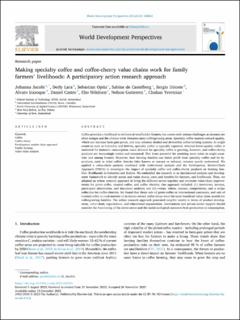Please use this identifier to cite or link to this item:
https://doi.org/10.21256/zhaw-29454| Publication type: | Article in scientific journal |
| Type of review: | Peer review (publication) |
| Title: | Making specialty coffee and coffee-cherry value chains work for family farmers’ livelihoods : a participatory action research approach |
| Authors: | Jacobi, Johanna Lara, Derly Opitz, Ed Wieland Sebastian de Castelberg, Sabine Urioste, Sergio Irazoque, Alvaro Castro, Daniel Wildisen, Elio Gutierrez, Nelson Yeretzian, Chahan |
| et. al: | No |
| DOI: | 10.1016/j.wdp.2023.100551 10.21256/zhaw-29454 |
| Published in: | World Development Perspectives |
| Volume(Issue): | 33 |
| Issue: | 100551 |
| Issue Date: | Mar-2024 |
| Publisher / Ed. Institution: | Elsevier |
| ISSN: | 2452-2929 2468-0532 |
| Language: | English |
| Subjects: | Coffee; Coffee-cherry; Participatory market chain approach; Family farming; Value chain analysis |
| Subject (DDC): | 338: Production 630: Agriculture |
| Abstract: | Coffee provides a livelihood to millions of smallholder farmers, but comes with serious challenges as incomes are often meagre and the climate crisis threatens most coffeegrowing areas. Specialty coffee markets reward quality, which can increase farm-gate prices, and may enhance shaded and diversified coffee-farming systems. In origin countries such as Colombia and Bolivia, specialty coffee is typically exported, whereas lower-quality coffee is marketed for domestic consumption. Local demand for specialty coffee is growing, however, and coffee-cherry products are increasingly traded and consumed. This bears potential for retaining more value in origin countries and among farmers. However, how farming families can better profit from specialty coffee and its byproducts, such as dried coffee cherries (also known as cascara or sultana), remains poorly understood. We applied a value-chain analysis combined with institutional analysis and the Participatory Market-Chain Approach (PMCA) to investigate the impact of specialty coffee and coffee-cherry products on farming families’ livelihoods in Colombia and Bolivia. We embedded the research in an institutional analysis and development framework to identify actors and value chains, costs and benefits for farmers, and livelihoods. Then, we adopted an action research approach to bring the different actors together and co-create value-chain improvements for green coffee, roasted coffee, and coffee cherries. Our approach included: (1) interviews, surveys, participant observation, and document analysis; and (2) events, videos, courses, competitions, and a recipe collection for coffee-cherries. We found that direct sale of green coffee to international customers, and sale of roasted coffee in local markets or in farmer-owned coffee shops were the most beneficial value-chain models for coffeegrowing families. The action research approach generated tangible results in terms of product development, value-chain organization, and educational organization. Government and private-sector support shouldconsider the functioning of the entire sector and the social-ecological outcomes from production to consumption. |
| URI: | https://digitalcollection.zhaw.ch/handle/11475/29454 |
| Fulltext version: | Published version |
| License (according to publishing contract): | CC BY-NC-ND 4.0: Attribution - Non commercial - No derivatives 4.0 International |
| Departement: | Life Sciences and Facility Management |
| Organisational Unit: | Institute of Chemistry and Biotechnology (ICBT) |
| Published as part of the ZHAW project: | Improving rural livelihoods through promoting high-quality coffee and coffee cherry products in the origin countries Colombia and Bolivia |
| Appears in collections: | Publikationen Life Sciences und Facility Management |
Files in This Item:
| File | Description | Size | Format | |
|---|---|---|---|---|
| 2024_Jacobi-etal_Making-specialty-coffee-and-coffee-cherry-value-chains-work.pdf | 4.77 MB | Adobe PDF |  View/Open |
Show full item record
Jacobi, J., Lara, D., Opitz, E. W. S., de Castelberg, S., Urioste, S., Irazoque, A., Castro, D., Wildisen, E., Gutierrez, N., & Yeretzian, C. (2024). Making specialty coffee and coffee-cherry value chains work for family farmers’ livelihoods : a participatory action research approach. World Development Perspectives, 33(100551). https://doi.org/10.1016/j.wdp.2023.100551
Jacobi, J. et al. (2024) ‘Making specialty coffee and coffee-cherry value chains work for family farmers’ livelihoods : a participatory action research approach’, World Development Perspectives, 33(100551). Available at: https://doi.org/10.1016/j.wdp.2023.100551.
J. Jacobi et al., “Making specialty coffee and coffee-cherry value chains work for family farmers’ livelihoods : a participatory action research approach,” World Development Perspectives, vol. 33, no. 100551, Mar. 2024, doi: 10.1016/j.wdp.2023.100551.
JACOBI, Johanna, Derly LARA, Ed Wieland Sebastian OPITZ, Sabine DE CASTELBERG, Sergio URIOSTE, Alvaro IRAZOQUE, Daniel CASTRO, Elio WILDISEN, Nelson GUTIERREZ und Chahan YERETZIAN, 2024. Making specialty coffee and coffee-cherry value chains work for family farmers’ livelihoods : a participatory action research approach. World Development Perspectives. März 2024. Bd. 33, Nr. 100551. DOI 10.1016/j.wdp.2023.100551
Jacobi, Johanna, Derly Lara, Ed Wieland Sebastian Opitz, Sabine de Castelberg, Sergio Urioste, Alvaro Irazoque, Daniel Castro, Elio Wildisen, Nelson Gutierrez, and Chahan Yeretzian. 2024. “Making Specialty Coffee and Coffee-Cherry Value Chains Work for Family Farmers’ Livelihoods : A Participatory Action Research Approach.” World Development Perspectives 33 (100551). https://doi.org/10.1016/j.wdp.2023.100551.
Jacobi, Johanna, et al. “Making Specialty Coffee and Coffee-Cherry Value Chains Work for Family Farmers’ Livelihoods : A Participatory Action Research Approach.” World Development Perspectives, vol. 33, no. 100551, Mar. 2024, https://doi.org/10.1016/j.wdp.2023.100551.
Items in DSpace are protected by copyright, with all rights reserved, unless otherwise indicated.